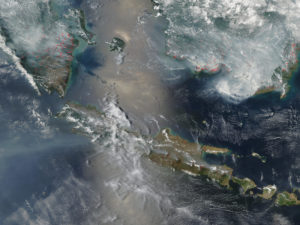
Indonesia, the world’s largest island nation, is looking for an operator with which to partner on a 150Gbps High Throughput Satellite (HTS) satellite that will deliver Internet connectivity to its as yet unconnected population.
The announcement was made on July 3, at the APSAT conference by Ir. Ismail, the ministry’s director general of resources and equipment of post and information technology. The minister confirmed that the government will target 145,000 public sites, including schools, hospitals as well as government offices across Indonesia and that the programme will support expansion of broadband infrastructure across the islands. The ministry hopes to award the contract by the end of 2018 with the aim of having the satellite orbited by 2022.
Indonesia currently faces a considerable challenge in terms of connected those that live outside of areas with existing infrastructure. The country’s 17,000 islands and 260 million-strong population means that it is difficult to provide terrestrial technologies that will meet its needs.
The planned 150Gbps satellite, in addition to another 50Gbps of capacity leased from other sources, would be the highest capacity system used to close a nation’s digital divide. At present, the country’s satellite operators: Telkom Indonesia, Pacific Satellite Nusantara, MCI, Bank Rakyat Indonesia and Indosat Ooredoo, provide under half of its satellite services, so more is required to enable the country to advance its digital infrastructure and to increase digital inclusion. “To date, Indonesia’s satellite demand cannot be met by Indonesia’s satellite industry,” Ismail said. Indonesian satellite operators are also still coming to terms with the delivery of broadband via satellite.
Also speaking during the event, Abdus Somad Arief, director of Telkom Indonesia’s Wholesale and International Service division explained that its satellites are currently primarily used to backhaul traffic for its cellular business, Telkomsel and that the company’s new satellite, Merah Putih, will also be used for cellular backhaul purposes.
The Indonesian government will ask its future partner to procure and arrange launch of the satellite after which point the government will take over the capacity for 15 years with capex from the private sector and revenue generated from government contracts. In addition, the partner will also have to provide the orbital slot for the satellite and the Ku- and Ka-band frequencies necessary for it to deliver broadband access.
SES Networks has confirmed interest in the initiative and would be prepared to collaborate with a local partner. Imran Malik, SES Networks vice president for the Asia Pacific, said that they are “actively exploring discussions”.





